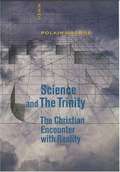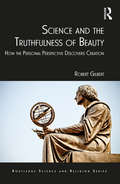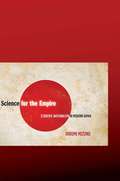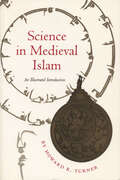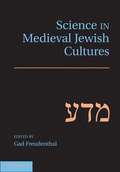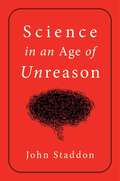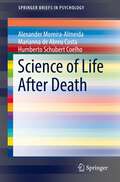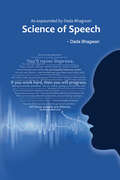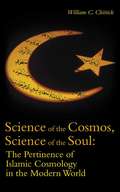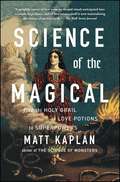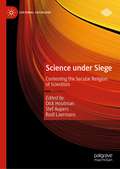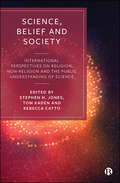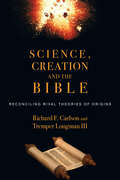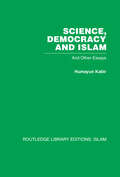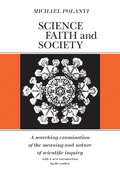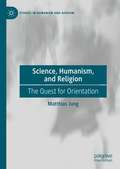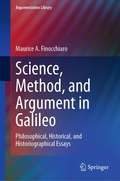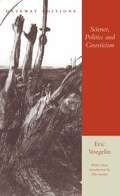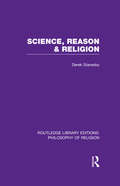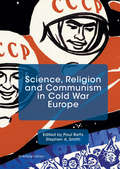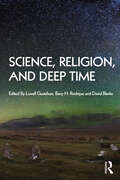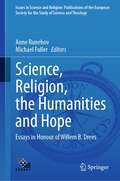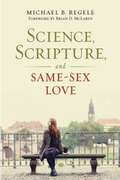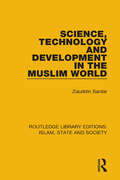- Table View
- List View
Science and the Trinity: The Christian Encounter with Reality
by John C. PolkinghorneMost often, the dialogue between religion and science is initiated by the discoveries of modern science--big bang cosmology, evolution, or quantum theory, for example. In this book, scientist-theologian John Polkinghorne changes the discussion. He approaches the dialogue from a little-explored perspective in which theology shapes the argument and sets the agenda of questions to be considered. The author begins with a review of approaches to science and religion in which the classification focuses on theological content rather than on methodological technique. He then proceeds with chapters discussing the role of Scripture, a theology of nature, the doctrine of God, sacramental theology, and eschatology. Throughout, Polkinghorne takes the perspective of Trinitarian thinking while arguing in a style that reflects the influence of his career as a theoretical physicist. In the final chapter, the author defends the appropriateness of addressing issues of science and religion from the specific standpoint of his Christian belief. His book provides an important model for theologians and scientists alike, showing how their two fields can inform one another in significant ways.
Science and the Truthfulness of Beauty: How the Personal Perspective Discovers Creation (Routledge Science and Religion Series)
by Robert GilbertWhen scientists describe their results or insights as 'beautiful', are they using the term differently from when they use it of a landscape, music or another person? Science and the Truthfulness of Beauty re-examines the way in which seeing beauty in the world plays the key role in scientific advances, and argues that the reliance on such a personal point of view is ultimately justified by belief that we are made in the 'image of God', as Christian and Jewish believers assert. It brings a fresh voice to the ongoing debate about faith and science, and suggests that scientists have as much explaining to do as believers when it comes to the ways they reach their conclusions.
Science for the Empire
by Hiromi MizunoMizuno (history, U. of Minnesota) explores the relationship between discourses of science, nationalism, and modernity in Imperial Japan, particularly focusing on competing promotions of science amongst Japanese technology-bureaucrats, Marxist intellectuals, and popular science writers engaged in the developing the new genre of popular science (tsuzoku kagagku) journalism and how those competing visions were eventually co-opted and mobilized by the Imperial state in support of wartime objectives. Annotation ©2009 Book News, Inc. , Portland, OR (booknews. com)
Science in Medieval Islam: An Illustrated Introduction
by Howard R. TurnerDuring the Golden Age of Islam (seventh through seventeenth centuries A. D. ), Muslim philosophers and poets, artists and scientists, princes and laborers created a unique culture that has influenced societies on every continent. This book offers a fully illustrated, highly accessible introduction to an important aspect of that culture-the scientific achievements of medieval Islam. Howard Turner opens with a historical overview of the spread of Islamic civilization from the Arabian peninsula eastward to India and westward across northern Africa into Spain. He describes how a passion for knowledge led the Muslims during their centuries of empire-building to assimilate and expand the scientific knowledge of older cultures, including those of Greece, India, and China. He explores medieval Islamic accomplishments in cosmology, mathematics, astronomy, astrology, geography, medicine, natural sciences, alchemy, and optics. He also indicates the ways in which Muslim scientific achievement influenced the advance of science in the Western world from the Renaissance to the modern era. This survey of historic Muslim scientific achievements offers students and general readers a window into one of the world's great cultures, one which is experiencing a remarkable resurgence as a religious, political, and social force in our own time.
Science in Medieval Jewish Cultures
by Gad FreudenthalScience in Medieval Jewish Cultures provides the first comprehensive overview by world-renowned experts of what we know today of medieval Jews' engagement with the sciences. Many medieval Jews, whether living in Islamic or Christian civilizations, joined Maimonides in accepting the rationalist philosophical-scientific tradition and appropriated extensive bodies of scientific knowledge in various disciplines: astronomy, astrology, mathematics, logic, physics, meteorology, biology, psychology, science of language and medicine. The appropriated texts - in the original or in Hebrew translation - were the starting points for Jews' own contributions to medieval science and also informed other literary genres: religious-philosophical works, biblical commentaries and even Halakhic (legal) discussions. This volume's essays will provide readers with background knowledge of medieval scientific thought necessary to properly understand canonical Jewish scientific texts. Its breadth reflects the number and diversity of Jewish cultures in the Middle Ages and the necessity of considering the fortunes of science in each within its specific context.
Science in an Age of Unreason
by John StaddonScience is undergoing an identity crisis! A renown psychologist and biologist diagnoses our age of wishful, magical thinking and blasts out a clarion call for a return to reason and the search for objective knowledge and truth. Fans of Matt Ridley and Nicholas Wade will adore this trenchant meditation and call to action.Science is in trouble. Real questions in desperate need of answers—especially those surrounding ethnicity, gender, climate change, and almost anything related to &‘health and safety&’—are swiftly buckling to the fiery societal demands of what ought to be rather than what is. These foregone conclusions may be comforting, but each capitulation to modernity&’s whims threatens the integrity of scientific inquiry. Can true, fact-based discovery be redeemed? In Science in an Age of Unreason, legendary professor of psychology and biology, John Staddon, unveils the identity crisis afflicting today&’s scientific community, and provides an actionable path to recovery. With intellectual depth and literary flair, Staddon answers pressing questions, including: Is science, especially the science of evolution, a religion? Can ethics be derived from science at all? How sound is social science, particularly surrounding today&’s most controversial topics? How can passions be separated from facts? Informed by decades of expertise, Science in an Age of Unreason is a clarion call to rebirth academia as a beacon of reason and truth in a society demanding its unconditional submission.
Science of Life After Death (SpringerBriefs in Psychology)
by Alexander Moreira-Almeida Marianna de Costa Humberto Schubert CoelhoThis book examines the best available empirical evidence regarding one of the most challenging and pervasive questions throughout ages, cultures, and religions: the survival of human consciousness after death. It begins with a contextual overview of belief in personal survival and refutes misguided historical and epistemological arguments against the notion of survival after death (e.g., irrational, purely religious, impossible to be addressed by science, that has been proved false by neuroscience). The book provides an overview of the scientific evidence regarding the survival of human consciousness after death, focusing on studies on mediumship, near-death and out-of-body experiences, and reincarnation.Featured topics of coverage include:The belief in life after death in the contemporary world as well as in the history of religions and philosophy.The key misguided arguments and prejudices against the academic study of afterlife survival.What constitutes empirical evidence for survival after death?The main explanatory hypotheses alternative to survival after death.The chief cultural barriers to a fair examination of the available evidence for survival of consciousness after death. Science of Life After Death is an essential resource for researchers, professors, and graduate students as well as clinicians, therapists, and other professionals in developmental and clinical psychology; spirituality, religious. and consciousness studies; psychiatry; neuroscience / neurology; phenomenology / philosophy; complementary and alternative medicine; and all interrelated disciplines.
Science of Speech
by Dada BhagwanThose seeking to lead a spiritual life may naturally become inspired to live in peace and non violence. To learn spiritual practices to develop these values, one may turn to spiritual teachers, and to variety of religion. But beginning to cultivate spiritual awareness is not always as simple as it seems – especially in family / unhealthy relationships, or while dealing with difficult people. Daily interactions such as these may feel like the very definition of conflict! In the book “Science Of Speech”, Gnani Purush (embodiment of Self knowledge) Dada Bhagwan offers key understanding about non violent communication, along with conflict resolution skills and conflict management strategies. His spiritual teaching on how to resolve conflict - or to avoid it altogether - is offered in the context of common and everyday relationship challenges. Whether wondering how to become more spiritual, or simply how to deal with negative people and difficult people, this book will prove invaluable.
Science of the Cosmos, Science of the Soul: The Pertinence of Islamic Cosmology in the Modern World
by William C. ChittickIslamic Intellectualism is dead: or so argues William Chittick in this radical new book challenging modern trends in religious thought. Whilst many may say that Islamic studies thrives as a subject, Chittick points to the words of one of his former Professors when describing young colleagues: "they know everything one can possibly know about a text, except what it says". Indeed, Chittick states that it is impossible to understand ancient Islamic texts without the years of contemplative study that are anathema to the modern education system. While the modern intellectual with faith often treats their studies and faith in two seperate spheres, Chittick argues that it is essential to return to the ways of the ancient Sufis, who viewed knowledge of the soul, the world, and God as an extension of the same thing, and he bemoans the loss of the spiritual and intellectual highs of the Medieval Islamic period.
Science of the Magical: From the Holy Grail to Love Potions to Superpowers
by Matt Kaplan“Filled with cool cocktail-party tidbits, Matt Kaplan considers how things that were once the stuff of legends could one day become reality” (The Atlantic) in this fun scientific inquiry into the mystical places and magical objects of ancient and contemporary lore—from the fountain of youth, to love potions, to Super Mario’s mushrooms.Can migrations of birds foretell our future? Do phases of the moon hold sway over our lives? Are there sacred springs that cure the ill? What is the best way to brew a love potion? How do we create mutant humans who regenerate like Wolverine? “In Science of the Magical, Matt Kaplan takes us on a journey spiced with the wonders of myth, history and art, leavened with impeccable research, endlessly fascinating. And the result is both a compelling read and a deeply thoughtful exploration of the world around us and the ways we seek to understand it” (Deborah Blum, author of The Poisoner’s Handbook). Like Ken Jennings and Mary Roach, Kaplan serves as a friendly armchair guide to the world of the supernatural. From the strengthening powers of Viking mead to the super soldiers in movies such as Captain America, Kaplan explores cultures and time periods to point out that there is often much more to these enduring magical narratives than mere fantasy. Informative and entertaining, Science of the Magical is “a sprightly survey” (The Wall Street Journal) and “a joy to read…highly recommended” (Library Journal, starred review).
Science of the Physical Creation in Christian Perspective (2nd Edition)
by Dewitt Steele Gregory ParkerTopics covered in this text book include atmosphere, weather, seas, molecules, weathering , erosion , waves , sound, light , color and many more.
Science under Siege: Contesting the Secular Religion of Scientism (Cultural Sociology)
by Dick Houtman Stef Aupers Rudi LaermansIdentifying scientism as religion’s secular counterpart, this collection studies contemporary contestations of the authority of science. These controversies suggest that what we are witnessing today is not an increase in the authority of science at the cost of religion, but a dual decline in the authorities of religion and science alike. This entails an erosion of the legitimacy of universally binding truth claims, be they religiously or scientifically informed. Approaching the issue from a cultural-sociological perspective and building on theories from the sociology of religion, the volume unearths the cultural mechanisms that account for the headwind faced by contemporary science. The empirical contributions highlight how the field of academic science has lost much of its former authority vis-à-vis competing social realms; how political and religious worldviews define particular research findings as favorites while dismissing others; and how much of today’s distrust of science is directed against scientific institutions and academic scientists rather than against science per se.
Science, Belief and Society: International Perspectives on Religion, Non-Religion and the Public Understanding of Science
by Stephen H. Jones, Tom Kaden and Rebecca CattoThe relationship between science and belief has been a prominent subject of public debate for many years, one that has relevance to everything from science communication, health and education to immigration and national values. Yet, sociological analysis of these subjects remains surprisingly scarce. This wide-ranging book critically reviews the ways in which religious and non-religious belief systems interact with scientific theories and practices. Contributors explore how, for some secularists, ‘science’ forms an important part of social identity. Others examine how many contemporary religious movements justify their beliefs by making a claim upon science. Moving beyond the traditional focus on the United States, the book shows how debates about science and belief are firmly embedded in political conflict, class, community and culture.
Science, Creation and the Bible: Reconciling Rival Theories of Origins
by Tremper Longman III Richard F. CarlsonMany Christians are torn between their belief in the Bible and the conclusions of science. This is especially the case concerning the creation narratives of Scripture and the rather different stories that science tells. Physicist Richard Carlson and biblical scholar Tremper Longman address the longstanding problem of how to relate scientific description of the beginnings of the universe with the biblical creation passages found in Genesis chapters 1 and 2. Experts in their respective fields, these two authors provide a way to resolve the seeming conflicting descriptions by showing the meaning of the biblical texts as well as the meaning of scientific description. In the process they will uncoverhow theology and science differ, and what they both contributewhat the key biblical passages actually sayhow the ancient Hebrews themselves understood the meaning of Genesis 1--2how the rest of Scripture helps us understand these passageswhat we can gain from science and what its limits areProperly interpreting the biblical texts and clearly identifying the nature of scientific claims are key. With those in hand we can see how Christian revelation and scientific findings about the origin of the universe are not in opposition but rather work in partnership with each other.
Science, Democracy and Islam: And other essays
by Humayun KabirFirst published in 2008. Routledge is an imprint of Taylor & Francis, an informa company.
Science, Faith and Society: A searching examination of the meaning and nautre of scientific inquiry
by Michael PolanyiIn its concern with science as an essentially human enterprise, Science, Faith and Society makes an original and challenging contribution to the philosophy of science. On its appearance in 1946 the book quickly became the focus of controversy. Polanyi aims to show that science must be understood as a community of inquirers held together by a common faith; science, he argues, is not the use of "scientific method" but rather consists in a discipline imposed by scientists on themselves in the interests of discovering an objective, impersonal truth. That such truth exists and can be found is part of the scientists' faith. Polanyi maintains that both authoritarianism and scepticism, attacking this faith, are attacking science itself.
Science, Humanism, and Religion: The Quest for Orientation (Studies in Humanism and Atheism)
by Matthias JungIn the human quest for orientation vis-à-vis personal life and comprehensive reality the worldviews of religionists and humanists offer different answers, and science also plays a crucial role. Yet it is the ordinary, embodied experience of meaningful engagement with reality in which all these cultural activities are rooted. Human beings have to relate themselves to the entirety of their lives to achieve orientation. This relation involves a non-methodical, meaningful experience that exhibits the crucial features for understanding worldviews: it comprises cognition, volition, and emotion, is embodied, action-oriented, and expressive. From this starting-point, religious and secular worldviews articulate what is experienced as ultimately meaningful. Yet the plurality and one-sidedness of these life stances necessitates critical engagement for which philosophy provides indispensable means. In the end, some worldviews can be ruled out, but we are still left with a plurality of genuine options for orientation.
Science, Method, and Argument in Galileo: Philosophical, Historical, and Historiographical Essays (Argumentation Library #40)
by Maurice A. FinocchiaroThis book collects a renowned scholar's essays from the past five decades and reflects two main concerns: an approach to logic that stresses argumentation, reasoning, and critical thinking and that is informal, empirical, naturalistic, practical, applied, concrete, and historical; and an interest in Galileo’s life and thought—his scientific achievements, Inquisition trial, and methodological lessons in light of his iconic status as “father of modern science.” These republished essays include many hard to find articles, out of print works, and chapters which are not available online. The collection provides an excellent resource of the author's lifelong dedication to the subject. Thus, the book contains critical analyses of some key Galilean arguments about the laws of falling bodies and the Copernican hypothesis of the earth’s motion. There is also a group of chapters in which Galileo’s argumentation is compared and contrasted with that of other figures such as Socrates, Karl Marx, Giordano Bruno, and his musicologist father Vincenzo Galilei. The chapters on Galileo’s trial illustrate an approach to the science-vs-religion issue which Finocchiaro labels “para-clerical” and conceptualizes in terms of a judicious consideration of arguments for and against Galileo and the Church. Other essays examine argumentation about Galileo’s life and thought by the major Galilean scholars of recent decades. The book will be of interest to scholars in philosophy, logic, philosophy of science, history of science, history of religion, philosophy of religion, argumentation, rhetoric, and communication studies.
Science, Politics and Gnosticism: Two Essays (The Collected Works Of Eric Voegelin Series #5)
by Eric VoegelinThis concise classic is the most accessible work in the canon of one of the 20th century'sgreatest political scientists. Eric Voegelin here contends that certain modern movements, including Positivism, Hegelianism, Marxism, and the "God is Dead" movement, are variants of the Gnostic tradition of antiquity. Highly provocative, this book is essential reading for students of modern politics, philosophy, and religion. <P><P>Hailed by the American Political Science Review as "one of the most distinguished interpreters to Americans of the non-liberal streams of European thought," Professor Voegelin was director of the Institute for Political Science at the University of Munich as well as professor of political science and lecturer at numerous universities in the United States and Europe. <P><P>With a new introduction by Ellis Sandoz, professor of political science at Lousiana State University and director of the Eric Voegelin Institute for American Renasissance Studies.
Science, Reason and Religion (Routledge Library Editions: Philosophy of Religion)
by Derek StanesbyPhilosophy matters. This is the message of this highly original inquiry into the relationship between science and religion. It is only when we examine the intellectual presuppositions on which science and religion are based, with regard to such fundamentals as truth, objectivity, and realism, that we perceive the link between these two enterprises which are essential to any characterization of man. The book offers a lucid and enlightening account of the main movements in the philosophy of science in the twentieth century, and then proceeds to demonstrate their consequences for philosophy of religion. After examining the wide and all-pervasive influence of positivism, and its offspring relativism, in both science and theology, he suggests that the attempt to provide an alternative, made by Karl Popper, offers the most satisfactory way forward in man’s twofold enquiry in terms of his relationship with God and with the world.
Science, Religion and Communism in Cold War Europe
by Stephen A. Smith Paul BettsReligion and science were fundamental aspects of Eastern European communist political culture from the very beginning, and remained in uneasy tension across the region over the decades. While both topics have long attracted a great deal of scholarly attention, they almost invariably have been studied discretely as separate stories. Religion, Science and Communism in Cold War Europe is the first scholarly effort to explore the delicate interface of religion, science and communism in Cold War Europe. It brings together an international team of researchers who address this relationship from a number of national viewpoints and thematic perspectives, ranging from mysticism to social science, space exploration to the socialist lifecycle, and architectural heritage to pop culture.
Science, Religion and Deep Time
by Lowell Gustafson Barry H. Rodrigue David BlanksThis book examines the meaning of religion within the scientific, evidence-based history of our known past since the big bang. While our current major religions are only centuries or millennia old, our volume discusses the origins and development of human religious practice and belief over our species’ existence of 300,000 years. The volume also connects the scientific approach to natural and social history with ancient truths of our religious ancestors using new lines of inquiry, new technologies, new modes of expression, and new concepts. It brings together insights of natural scientists, social scientists, philosophers, writers, and theologians to discuss narratives of the universe. The essays discuss that to apprehend religion scientifically, or to interpret and explain science theologically, the subject must be examined through a variety of disciplinary lenses simultaneously and raise several theoretical, philosophical, and moral problems. With a singular investigation into the meaning of religion in the context of the 13.8 billion-year history of our universe, this book will be indispensable for scholars and students of religious studies, big history, sociology and social anthropology, philosophy, and science and technology studies.
Science, Religion, the Humanities and Hope: Essays in Honour of Willem B. Drees (Issues in Science and Religion: Publications of the European Society for the Study of Science and Theology #8)
by Michael Fuller Anne RunehovThis book collects a multidisciplinary range of contributions focusing on the prolific and seminal work of Willem Drees in the fields of philosophy of religion, philosophy of the humanities, and science and theology/religion. Trained in both theoretical physics and theology/philosophy of religion, Drees holds doctoral degrees in both theology and in philosophy and, amongst other distinguished positions, held professorships at the University of Leiden and at the University of Tilburg. Drees was also Editor-in-Chief of Zygon, Journal of Religion & Science, between 2008 and 2018, and served as President of the European Society for the Study of Science and Theology (ESSSAT) between 2002 and 2008. In 2018, he was elected as member of the Royal Holland Society of Sciences and Humanities (KHMW). This contributed volume builds on Drees’ expansive and provocative scholarly contributions, notably around the concept and meaning of naturalism and the humanities to the fields of science and religion, as exemplified by his works Religion, Science and Naturalism (1996) and What Are the Humanities For? (2021). In a time where more and more young people across the globe are entering higher education such cross-disciplinary explorations and (re-)evaluations are vital to the field. Accordingly, by approaching his work from a variety of disciplines this collection illuminates the broad reach of Drees’ work and provides scholars from various fields with many new and rich opportunities avenues for research.
Science, Scripture, and Same-Sex Love
by Michael B. RegeleSome church leaders assert that same-sex practices are incompatible with Christian teaching. The issues threaten to divide our churches and our nation. Michael B. Regele explores current scientific findings in biological brain research, psychology, and sociology, which he compares with scriptural teaching from the Bible, to show that a faithful reading of the Scriptures is consistent with Christian teaching that affirms same-sex love leading to same-sex marriage and full participation of LGBT people in church leadership. Regele offers compelling research and well-supported answers to common-place questions such as: Is sexual orientation a choice that individuals make? Is same sex attraction sinful in itself? Is it true that lesbian, gay, bi-sexual, and transgender (LGBT) people are more promiscuous than heterosexual people? Is it true that same-sex relationships do not last as long as hetero-sex relationships? Is abstinence for life the only choice for a Christian LGBT person? Or can they enter into intimate and sexual relationships and still be active participants in a Christian community? Is same-gender marriage acceptable from a Christian standpoint?
Science, Technology and Development in the Muslim World (Routledge Library Editions: Islam, State and Society)
by Ziauddin SardarThis book, first published in 1977, aims to present a Muslim view of development and highlights some of the related issues that were being debated in the Muslim world. The author outlines the parameters of the Muslim world as well as the Muslim world-view, and provides an analysis of science, science policy and Muslim culture. This title will be of interest to students of economic and social policy, as well as students of Middle Eastern studies.
